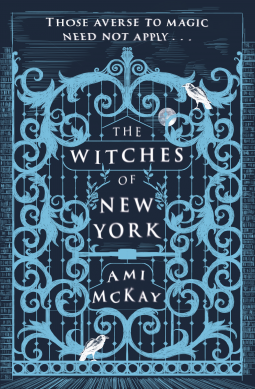
ABOUT THE AUTHOR:
Ami McKay’s debut novel, The Birth House was a # 1 bestseller in Canada, winner of three CBA Libris Awards, nominated for the International IMPAC Dublin Literary Award, and a book club favourite around the world.
Her new novel. The Virgin Cure, is inspired by the life of her great- great grandmother, Dr. Sarah Fonda Mackintosh, a female physician in nineteenth century New York. Born and raised in Indiana, Ami now lives in Nova Scotia
Her new novel. The Virgin Cure, is inspired by the life of her great- great grandmother, Dr. Sarah Fonda Mackintosh, a female physician in nineteenth century New York. Born and raised in Indiana, Ami now lives in Nova Scotia
DESCRIPTION:
The beloved, bestselling author of The Birth House and The Virgin Cure is back with her most beguiling novel yet, luring us deep inside the lives of a trio of remarkable young women navigating the glitz and grotesqueries of Gilded-Age New York by any means possible, including witchcraft...
The year is 1880. Two hundred years after the trials in Salem, Adelaide Thom ('Moth' from The Virgin Cure) has left her life in the sideshow to open a tea shop with another young woman who feels it's finally safe enough to describe herself as a witch: a former medical student and "gardien de sorts" (keeper of spells), Eleanor St. Clair. Together they cater to Manhattan's high society ladies, specializing in cures, palmistry and potions--and in guarding the secrets of their clients.
All is well until one bright September afternoon, when an enchanting young woman named Beatrice Dunn arrives at their door seeking employment. Beatrice soon becomes indispensable as Eleanor's apprentice, but her new life with the witches is marred by strange occurrences. She sees things no one else can see. She hears voices no one else can hear. Objects appear out of thin air, as if gifts from the dead. Has she been touched by magic or is she simply losing her mind?
Eleanor wants to tread lightly and respect the magic manifest in the girl, but Adelaide sees a business opportunity. Working with Dr. Quinn Brody, a talented alienist, she submits Beatrice to a series of tests to see if she truly can talk to spirits. Amidst the witches' tug-of-war over what's best for her, Beatrice disappears, leaving them to wonder whether it was by choice or by force.
As Adelaide and Eleanor begin the desperate search for Beatrice, they're confronted by accusations and spectres from their own pasts. In a time when women were corseted, confined and committed for merely speaking their minds, were any of them safe?
The year is 1880. Two hundred years after the trials in Salem, Adelaide Thom ('Moth' from The Virgin Cure) has left her life in the sideshow to open a tea shop with another young woman who feels it's finally safe enough to describe herself as a witch: a former medical student and "gardien de sorts" (keeper of spells), Eleanor St. Clair. Together they cater to Manhattan's high society ladies, specializing in cures, palmistry and potions--and in guarding the secrets of their clients.
All is well until one bright September afternoon, when an enchanting young woman named Beatrice Dunn arrives at their door seeking employment. Beatrice soon becomes indispensable as Eleanor's apprentice, but her new life with the witches is marred by strange occurrences. She sees things no one else can see. She hears voices no one else can hear. Objects appear out of thin air, as if gifts from the dead. Has she been touched by magic or is she simply losing her mind?
Eleanor wants to tread lightly and respect the magic manifest in the girl, but Adelaide sees a business opportunity. Working with Dr. Quinn Brody, a talented alienist, she submits Beatrice to a series of tests to see if she truly can talk to spirits. Amidst the witches' tug-of-war over what's best for her, Beatrice disappears, leaving them to wonder whether it was by choice or by force.
As Adelaide and Eleanor begin the desperate search for Beatrice, they're confronted by accusations and spectres from their own pasts. In a time when women were corseted, confined and committed for merely speaking their minds, were any of them safe?
REVIEW:
I was up for a thrill with this one. I chose it for one sole reason and it was to bring some more magic to my Halloween weekend, but alas, this was not the case. I was expecting true witches, horrendous villains, magic - dark or light, and excitement. The Witches of New York is not about that. It is intended as a sequel to The Virgin Cure, though it can certainly be read as a standalone. Personally, I haven't read The Virgin Cure so my statement fully stands.
This is a novel about women, not about witches in the scary magical way. Witch here stands for a strong, intelligent, independent, warrior women, who know life, and how to live it, who stand for themselves and for those who can't defend themselves. It is a moving description of the struggles such women had to live through in the 19th century. Their magic is their femininity, their wand their brilliant minds.
The evil that exists is found not in the witches but in other people. There’s a scorned husband who uses his wealth and power to exact revenge on the woman whom he believes led his wife astray. And there’s the religious zealot, Francis Townsend, a puritanical and sadistic preacher who has made it his life’s mission to find witches and either reform or destroy them. Unfortunately, these villains, including Sister Piddock, are more caricatures than convincing characters.
What the three women are is intelligent and independent in a time when those characteristics in women were viewed by many as threatening. People were told to beware of women “touting intelligence over righteousness” especially if they were “the healer, the fortune teller, the academic, the suffragist.”
Viewed from this point of view, The Witches of New York is a brilliantly exploited topic that aims to trigger will for surviving, a breath of pride in every woman. Sadly, there are a lot of questions left unanswered:
What exactly happens to Lucy Newland? What about Bart Andersen and Sophie Miles? What is the fate of Adelaide’s mother? These characters play significant roles, but then they are just dropped.
The novel is rather slow-paced. Gradually suspense is introduced, but the outcome in cases of real danger is predictable. I don't find this to be necessary a fault of the author, because the story makeups for it in other aspects. After reading it I am glad I did, because some times you need a reminder, that being a woman is the most special gift you could have been given by destiny, yet I can't suppress the wish for more magic, and more adventure in it.
It is a lovely, inspiring read, that will move you and leave you thankful for the existence of such women as Ami McKay.


No comments:
Post a Comment